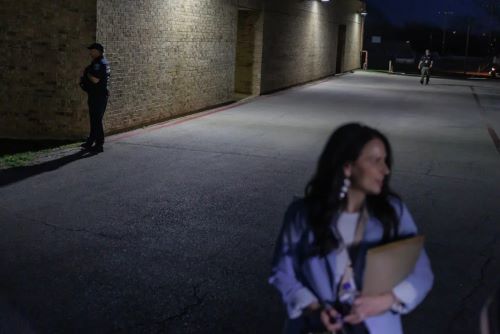

She has disavowed the far-right platform she campaigned on after finding no evidence to support conspiracies.

By Jeremy Schwartz
Investigative Reporter
ProPublica and The Texas Tribune
Introduction
Weeks after winning a school board seat in her deeply red Texas county, Courtney Gore immersed herself in the district’s curriculum, spending her nights and weekends poring over hundreds of pages of lesson plans that she had fanned out on the coffee table in her living room and even across her bed. She was searching for evidence of the sweeping national movement she had warned on the campaign trail was indoctrinating schoolchildren.
Gore, the co-host of a far-right online talk show, had promised that she would be a strong Republican voice on the nonpartisan school board. Citing “small town, conservative Christian values,” she pledged to inspect educational materials for inappropriate messages about sexuality and race and remove them from every campus in the 7,700-student Granbury Independent School District, an hour southwest of Fort Worth. “Over the years our American Education System has been hijacked by Leftists looking to indoctrinate our kids into the ‘progressive’ way of thinking, and yes, they’ve tried to do this in Granbury ISD,” she wrote in a September 2021 Facebook post, two months before the election. “I cannot sit by and watch their twisted worldview infiltrate Granbury ISD.”
But after taking office and examining hundreds of pages of curriculum, Gore was shocked by what she found — and didn’t find.
The pervasive indoctrination she had railed against simply did not exist. Children were not being sexualized, and she could find no examples of critical race theory, an advanced academic concept that examines systemic racism. She’d examined curriculum related to social-emotional learning, which has come under attack by Christian conservatives who say it encourages children to question gender roles and prioritizes feelings over biblical teachings. Instead, Gore found the materials taught children “how to be a good friend, a good human.”
Gore rushed to share the news with the hard-liners who had encouraged her to run for the seat. She expected them to be as relieved and excited as she had been. But she said they were indifferent, even dismissive, because “it didn’t fit the narrative that they were trying to push.”
So, in the spring of 2022, Gore went public with a series of Facebook posts. She told residents that her backers were using divisive rhetoric to manipulate the community’s emotions. They were interested not in improving public education but rather in sowing distrust, Gore said.
“I’m over the political agenda, hypocrisy bs,” Gore wrote. “I took part in it myself. I refuse to participate in it any longer. It’s not serving our party. We have to do better.”

Gore’s open defiance of far-right GOP orthodoxy represents an unusual sign of independence in a state and in a party that experts say increasingly punish those deemed disloyal. It particularly stands out at a time when Republican leaders are publicly attacking elected officials who do not support direct funding to private schools.
“It’s a rare event to see this kind of political leap, especially in a world that’s so polarized,” said University of Houston political scientist Brandon Rottinghaus. “You rarely see these kinds of changes because the people who are vetted to run tend to be true believers. They tend not to be people who are necessarily thinking about the holistic problem.”
“With the presence of Donald Trump, fealty to cause has amplified, so this kind of action is much more meaningful and much more visible than it was a decade ago,” Rottinghaus said about Gore.
In March, Texas Gov. Greg Abbott, a Republican, was victorious in unseating five lawmakers in his own party and forcing another three into runoff elections after they voted against voucher legislation that would allow the use of public dollars for students to attend private and religious schools. His efforts sent a message that those who did not unflinchingly support his priorities would face grave political repercussions.
Gore was part of a similar movement of hard-liners who pushed out the Republican Hood County elections administrator in 2021 after determining that she was not conservative enough for the nonpartisan position. Now Gore and other disillusioned local Republicans have formed a group pushing against an “ultra-right” faction of the party that it says has become obsessed with “administering purity tests” and stoking divisive politics.
The former teacher and mother of four was influenced by such politics when she decided to run for office. She was motivated to seek a school board seat after a steady stream of reports from the right-wing media she consumed and her social media feeds pointed to what she saw as inappropriate teachings in public schools. She, too, had been outraged by school mask mandates and vaccine requirements during the throes of the COVID-19 pandemic.
But Gore said she feels that she was unwittingly part of a statewide effort to weaken local support of public schools and lay the groundwork for a voucher system.
And she said that unless she and others sound the alarm, residents won’t realize what is happening until it is too late.
“I feel like if I don’t speak out, then I’m complicit,” Gore said. “I refuse to be complicit in something that’s going to hurt children.”
Because of that outspokenness, Gore is facing backlash from the same people who supported her race. She has been threatened at raucous school board meetings and shunned by people she once considered friends.
School marshals escort her and her fellow board members to their cars to ensure no one accosts them.

When things get particularly heated, a fellow trustee follows her in his car to make sure she gets home safely.
None of It Was Adding Up
Before Gore decided to seek office for the first time, prominent GOP operatives had been pushing for like-minded allies to take over school boards, framing the effort as necessary to maintain conservative Christian values.
In May 2021, former Trump adviser Steve Bannon told followers on his podcast that school boards were the road back to power for conservatives following the 2020 presidential election. Two months later, North Texas-based influential pastor Rafael Cruz, the father of U.S. Sen. Ted Cruz, amplified that message on social media, saying that getting candidates on school boards was critical.
“We need to make sure that strong, principled Americans, those who uphold our Judeo-Christian principles that have made America the greatest country in the world, are elected to school boards,” Rafael Cruz said in a July 2021 video posted to his Facebook page. “Because I’ll tell you the left is controlling the school boards in America.”
Those messages reached Granbury, where former Republican state Rep. Mike Lang and political consultant Nate Criswell asked Gore to run for the school board. Gore recalls hearing Cruz give a fiery speech while she was campaigning. In the speech, which reinforced her decision to run, she said Cruz boasted about flipping the school board in Southlake, Texas, by getting the churches involved in helping to install Christian candidates.
“When you put in the minds of parents that there is an agenda to indoctrinate their children … and the only answer is to get conservative Christian people elected to the school board,” Gore said, “it’s a very powerful message.”
Gore, now 43, first became involved in local politics in 2016 when she campaigned door-to-door for Lang, a former constable who successfully ran for the Texas Legislature. She then served on a leadership committee for the Hood County GOP.
After Lang decided not to run for reelection in 2020, he asked Gore to join the “Blue Shark” show, a web-based program he founded and co-hosted with Criswell that produced videos taking aim at local politicians and officials considered insufficiently conservative. Criswell later ran campaigns for Gore and Melanie Graft, another school board candidate who previously tried to remove LGBTQ-themed books from the children’s section of the county library.
Soon after the women won their elections, the Granbury school district descended into a high-profile fight over school library books.
Administrators pulled 130 library books from the shelves after Matt Krause, a Republican representative from Fort Worth, published a list of 850 titles that he said touched on themes of sexual orientation and race. At the time, ProPublica, The Texas Tribune and NBC News obtained audio of the district’s superintendent, Jeremy Glenn, making clear to librarians that he had concerns about books with LGBTQ themes, including those that did not contain descriptions of sex. After the reporting, the Department of Education opened a civil rights investigation, which is ongoing, into whether the district violated federal laws that prohibit discrimination based on sexual orientation and gender.
A volunteer review committee of parents and district employees eventually recommended returning nearly all of the books to the shelves.
Hard-liners wanted additional titles removed, claiming that the district was allowing “pornography,” without offering evidence to support the assertion. But Gore backed the committee’s findings, saying she was satisfied with the handful of books the district had removed for explicit content. Glenn, too, drew the ire of his onetime allies after he also suppxcorted the committee’s recommendation. Lang and Criswell have since called for his ouster. Glenn declined an interview request through a district spokesperson.
The book debate, along with a series of other fissures, contributed to Gore’s growing belief that her former colleagues were more interested in misleading residents than in improving educational outcomes.
In early 2022, leaders of the rapidly growing district announced plans to ask voters for $394 million in bonds to build a new high school and renovate existing campuses. School board members established a community advisory committee that would counsel the district.
Gore chose Criswell as her representative on the committee. She thought that once Criswell saw the district’s needs firsthand, he would support the bonds. But the opposite happened. Criswell urged voters to reject the measure, claiming some parts, such as providing full-day pre-K programs for all students, were “communist in nature.”
Gore said Criswell directed her and Graft, who did not respond to requests for comment, to post messages on social media against the bonds. When Gore pushed back, she said Criswell accused her of betraying the party. (The bonds ultimately lost by a wide margin.)
According to Gore, Criswell also pressured her to stop speaking with all of her fellow school board members, except for Graft. “They’re just lying to you. They’re not your friends,” she recalled him saying.
“I was like, how am I supposed to do my job as a board member if I’m not talking to anybody?” Gore said. “None of it was adding up.”
Criswell, who has previously said that he supports public schools, declined to answer detailed questions. Lang did not respond to requests to comment. In April 2022, Gore rescinded her nomination of Criswell to the bond advisory board. She felt that he and Lang were misleading voters about the bond and its cost to taxpayers.
“Mike Lang would call them snowballs,” she said. “You just get as many little snowballs as you can so you’re attacking from multiple fronts. And then you see which ones start to stick and gather speed and get bigger and bigger.”
In June 2022, Lang and Criswell directed one of their snowballs in Gore’s direction, taking a veiled shot at the former co-host of their show. In a video, Criswell praised Graft for continuing the fight to remove books from the school district’s libraries, saying she was “the only one that acts as the buffer right now on that board. Which is sad, because, you know, we’ve had other people elected in recent elections that just haven’t lived up to the expectations.”
Three days later, Gore fired back.
“I refuse to be someone’s puppet,” she wrote in a June 8 Facebook post. “I refuse to be told what to do, what to say or how to vote. I refuse to participate in any agenda that will dismantle or abolish public education.”
“Extremism IS the Problem”

A week after that post, Gore watched the livestream of a Granbury school board meeting on her laptop from a hotel room along Mexico’s Caribbean coast while on an anniversary trip with her husband.
Emotions ran high as about a dozen residents complained that board members had not removed enough books from the library. Some argued that the school board was stifling dissent from Graft by requiring the consent of two board members to place an item on the agenda.
During the meeting, Cliff Criswell, the grandfather of Nate Criswell, took the microphone, carrying what police would later describe as a black handgun in a leather holster. He accused board members of allowing pornography in school libraries and of trying to “rip apart” Graft, whom he had previously described as “the only conservative on the board.”
“We have profile sheets” on all the trustees except for Graft, Cliff Criswell shouted. “We know what you do. We know where you live.”
Gore was shocked. Panicked, she started calling family members. “My grandmother was home with our children,” she recalled in an interview. “My brother came over and slept on my front porch to make sure nobody showed up at our house in the middle of the night. I mean, my kids were terrified after that.”
Later that night, Gore addressed the incident on Facebook.
“Tonight, threats were made against me, every board member (except one) and our superintendent. We were individually called out by name, told we had profile sheets made on each of us and that we would be dealt with accordingly. THIS IS NOT OK. I take threats against myself and my family seriously, especially with all of the violence in today’s world. Will we be dealing with school board shootings next?!? WE MUST DO BETTER!”
In response to a commenter’s message of support, Gore wrote, “extremism IS the problem.”
According to a Granbury police report, an off-duty officer spotted a black pistol in a holster in Cliff Criswell’s waistband and alerted school and city police. Possession of an unauthorized firearm at a school board meeting is a third-degree felony under state law, but because officers didn’t conclusively identify the weapon that night, and because Cliff Criswell declined to cooperate, prosecutors were unable to file charges, said Granbury police Deputy Chief Cliff Andrews. Cliff Criswell could not be reached for comment.
“Had we identified the gun at the very moment, yes, absolutely, we could have filed charges on it,” Andrews said. “We made a simple mistake.”
The incident forced the district to adopt tighter security measures, including clearly posting signs prohibiting firearms and bringing in additional officers during board meetings anytime administrators expect that certain topics could lead to heated exchanges.
“That was the moment I saw how crazy it was, how unhinged it had become and how far some people were willing to go to prove their points,” Gore said.

Yet rhetoric over the school district only ratcheted up in the ensuing months.
That fall, Hood County’s far-right leaders backed the school board candidacy of Karen Lowery, who in May 2022 was one of two women who filed a criminal complaint against district librarians claiming they were providing pornography to children. A Hood County constable has declined to answer questions about the status of the complaint.
Lowery, who had served on the committee that reviewed library books but opposed returning them to the shelves, also received a key endorsement from Rafael Cruz. She went on to win her election in November 2022.
Her victory helped resurface the district’s book battles as she pressed to remove more titles. Then, in August 2023, Lowery snuck into a high school library during a charity event and began inspecting books using the light of her cellphone, according to a district report.
School board members met to discuss censuring Lowery at an Aug. 23 public meeting for violating a policy that requires them to get permission from principals when entering a campus and for not being truthful when confronted by an administrator. Lowery claimed she had disclosed her visit to the library beforehand as required. She did not respond to calls or emails seeking comment. A district spokesperson said he was unable to pass along an interview request because Lowery has requested to only be contacted through her board email.
The board voted to censure Lowery, who opposed the symbolic measure along with Graft.
“It is clear that the actions Mrs. Lowery took, as evidenced by the community and the outcry that we have heard tonight, has broken some of that trust with our staff, parents and community members,” said Gore, who motioned to censure Lowery. “The only people that pay the price for this, no matter what happens tonight, are the kids of this district.”
Old Foe, New Friend
By November 2023, the battle lines over school vouchers were hardening in Granbury, and at the state Capitol in Austin.
Abbott had begun waging war against Republicans who had not supported voucher efforts and contributed to their failure during the last legislative session. One lawmaker who escaped Abbott’s wrath was Shelby Slawson, a Republican who represents Hood County. Unlike some of those now being targeted, Slawson had bucked a request spearheaded by Gore and supported by the school board majority that urged lawmakers to vote against a measure that would send public dollars to private schools. Slawson did not respond to questions regarding her decision to vote in favor of vouchers despite the local school district’s opposition to the legislation.
Meanwhile, Granbury was facing a tough election. The school district was asking voters to approve a $151 million bond measure to build a new elementary school in the rapidly growing and overcrowded district, as well as provide security updates and renovations to aging campuses. The balance of the school board was also at stake in the same election.
Bond opponents formed the Granbury Families political action committee. In advertising materials, the group cited library books as one of the principal reasons residents had lost trust in the board. “Our community has lost faith in the board’s ability to conduct business,” the group claimed. “Not another penny until GISD gets new leadership.”
Nate Criswell, Gore’s former co-host and campaign manager, loaned the PAC $1,750, according to campaign finance reports filed with the district. The loan constituted about 40% of the PAC’s funding ahead of the November election.
Although a majority of the state’s school districts with bond measures scored victories, Granbury’s tax measure failed once again. (Voters rejected another bond measure this month.) Hard-line conservatives celebrated the loss, pointing to anger over the library books issue.
But even as they celebrated, the November election delivered a setback to those who wanted to take over the school board. The two candidates supported by hard-line conservatives lost by wide margins, denying the county’s far-right faction the majority on the board. Among the winners in that election was Nancy Alana, the school board member whom Gore ousted two years earlier. This time around Gore endorsed Alana, and the two former opponents have since become friends and allies.
“She let everybody know that she had been misled and that she has seen for herself the good things that are happening in our school district,” Alana said. “That the school board can be trusted. That the administrators can be trusted. And she has spoken out on that. And that has made a big difference. And she is very well thought of in our community because of her willingness to step up and say, ‘I was wrong.’”
Originally published by ProPublica, 05.15.2024, under a Creative Commons Attribution-NonCommercial-NoDerivs 3.0 United States license.






